4BR Time Team - The WD & HO Wills Contests
7-Jan-2010A contest that profit shared, had open adjudication, pre draws, free bandsmen tickets and took place at the Albert Hall? So why did the WD & HO Wills Contest only last 4 years?.
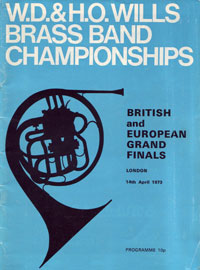 Would you ever think there would be an appetite in the brass band movement for a major contest that would feature an invited field of the very best bands to play at one of the finest concert halls in the country, with open adjudication, a pre draw, free bandsmen’s tickets, travel expenses, generous prize money for the prize winners, and the profits of the contest distributed between competing bands?
Would you ever think there would be an appetite in the brass band movement for a major contest that would feature an invited field of the very best bands to play at one of the finest concert halls in the country, with open adjudication, a pre draw, free bandsmen’s tickets, travel expenses, generous prize money for the prize winners, and the profits of the contest distributed between competing bands?
Breathtaking
Almost a decade before the European Championships came into being in London in 1978, one such contest did exist – albeit for a very short period of time: The W.D.& H.O. Wills Brass Band Championships.
Wills (the WD stood for William Day, the HO, for Henry Overton) were a tobacco manufacturer based primarily in Bristol, of such lung sapping gaspers as the literally breathtaking ‘Woodbine’ brand and famous ‘Embassy’ range.
In the early 1970s tobacco advertising was not subject to such draconian government restrictions as today and Wills were a confident presence on television (although cigarette adverts themselves were banned in 1965) and sporting events, especially with their involvement in horse jumping and motor racing.
The announcement that the company would provide sponsorship for a new event came in 1969, with short press release in British Bandsman of 7th June.
Regional contests
The Championships would see four regional qualifying contests take place later in the year and the Spring of 1970 at Plymouth, Cardiff, Wolverhampton and Manchester.
What made these contests different however was that bands would be able to choose which contest they wished to compete in, that open adjudication would be used, only bands that met a prescribed marking standard would qualify for the finals, and that that the same adjudicators would attend all regional contests.
The added incentive (attractive at a time when collective bargaining was very much in vogue) was that the competing bands would get a share of the profits.
What wasn't there to like?
Even if you weren’t keen on smoking (Health warnings on cigarette packets stated to appear in 1971) what wasn’t there to like about this contest? Even the running of it would be in the hands of the Council of Brass Band Associations, led by the estimable Ted Buttress.
Later that June further details were announced: the finals would take place at the De Montford Hall in Leicester in March 1970, whilst the regional contests to decide who got there would start in the November and end in January.
New works
New works were commissioned for the finals and would then be reused as the regional test pieces the following year, whilst all bands achieving a mark of 180 or more would be invited to the finals regardless of where they came in the qualifying competitions.
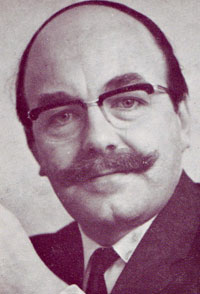 The Final itself would see three adjudicators in the open (later reduced to two and including the wonderfully moustachioed Raymond Thorpe - right) with an aggregate total of the marks deciding the winner.
The Final itself would see three adjudicators in the open (later reduced to two and including the wonderfully moustachioed Raymond Thorpe - right) with an aggregate total of the marks deciding the winner.
The announcement immediately caught the imagination of jaded bandsmen and even British Bandsman loquaciously offered its support: “If there are some who feel that the contesting calendar is already threatening to be overfull, the only satisfactory answer for any new entrant to the field is to justify its arrival by supplying a need or opportunity which is proven and justify it by events of the foremost quality. For quality is the ultimate criterion.”
Not to plan
Not everything quite went to plan though – the proposed Welsh contest was cancelled due to a clash with an existing event, and bands were asked to compete at Bristol a few months later. Not for the first time there were problems with the Welsh registry.
A few months later it was announced that BBC television would cover the Plymouth event (including a recording of a band playing the test piece, ‘The Frogs’ by Granville Bantock), and that EMI would record part of the Finals Gala Concert.
Doubts over the inclusion of percussion were also alleviated as the organisers confirmed that a complete set of new percussion equipment would be on hand for all bands to use at the finals.
First contest
The first Wills regional contest took place in front of a reported ‘full house’ at Plymouth’s Guildhall on November 2nd 1969, where Camborne Town took the honours. Five bands in the respective sections qualified for the Leicester Final.
A week later, Ted Buttress announced that competing bands picked up £20 each as their share of the profits, whilst a further amount would be held centrally to be dispersed amongst the qualifying finalists.
The slick PR work of a tobacco company that already knew it was in need of capturing the imagination of a compliant audience if the contests were to succeed saw the announcement of a ‘Castella Award’ which would be made to ‘…an unpaid worker who has given service to the band community’. The lucky picked up an engraved ashtray worth £15, plus a Castella tie and a drum of Castella cigars.
70 bands now entered the North West event, where Yorkshire Imps under Trevor Walmsley booked their place at the Final. Such was the high standard of playing in all the sections on the day that 30 bands obtained the required 180 mark in all the sections to join them there.
Commissioned works
Early 1970 saw the announcement of the commissioned works to be used at the Finals, with Wills ensuring that their products wouldn’t be far from the minds of the players or the audience, with the aptly titled ‘Embassy Suite’ by Allan Street picked for the top section and the overture ‘Promenade’ by Frank Bryce for the Second.
The rather ironically entitled ‘The Pacemakers’ (Wills advertised themselves as ‘Pacemakers in Tobacco’) by an up and coming young composer called Edward Gregson was chosen for the in the Third Section (ironic in that if you smoked enough you certainly needed one in years to come), whilst the Fourth Section bands had John Carr’s ‘Fancy Free’.
The final regional contests were completed in Bristol and Wolverhampton with large fields of competing bands, and where Morris Concert under the direction of Cliff Edmunds and Ransome & Marles conducted by Denis Masters took the top prizes.
Wills increased the profile of the Finals further with another well timed announcement of a Gala Concert featuring Harry Mortimer as guest conductor.
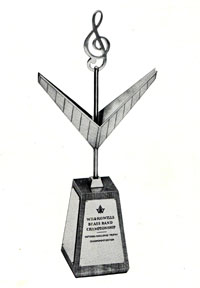 1970 Final
1970 Final
On 22nd March 1970 the first W.D. & H.O. Wills Brass Band Championship Final took place with 65 competing bands in four sections at the De Montfort Hall.
The first winners were Morris Motors, who adjudicators Allan Street and John Baldwin awarded the Silver Clef Trophy (right) and the £100 top prize ahead of Ransome & Marles, Yorkshire Imps and Newham.
In the other sections there were wins for Rockingham, Glossop and Coventry School of Music, whilst over £2,000 was to be returned to competing bands as their share of the profits.
Champion of Champions
Plans were already underway for the next series of contests in 1971 with the first ever ‘Champion of Champions’ contest to try and entice the very best bands in the land to compete.
In June 1970 further plans were unveiled that would see the Championships take place at the Royal Albert Hall, plus an extra regional event in Sheffield.
The 'Champion of Champions' Section would see 16 invited bands take part in a new contest that would also see the band winning the ‘Championship Section’ replace the band that came bottom of the ‘Champions’ contest each year.
Second series of contests
And so the second series of Wills contests started in October 1970 at Wolverhampton (won by William Davis Construction) followed by the others where the total number of bands once again showed a significant increase.
Wills also showed that they were not adverse to a bit of opportunism either – announcing that the test piece for the ‘Champion of Champions’ event would be Gilbert Vinter’s ‘James Cook – Circumnavigator’ (recently used at the New Zealand Championships just a few months after the death of the composer), whilst Edward Gregson’s new work, ‘Essay’ was earmarked for the Championship event.
The contest was now seen as a serious rival to the Nationals, which had recently disastrously indulged in a poorly thought out ‘World Championship’ initiative.
With the BBC covering the event, recording deal, a £200 top prize and no qualification process, the ‘Champions’ contest was proving to be a winner.
Dark clouds
However, the first dark clouds had begun to appear on the tobacco horizon as poor industrial relations in the industry, the prospect of increased government taxation, restrictions on advertising and increased production costs had started to affect the once prosperous company.
Wills were committed to the crippling expense of a fancifully designed, but already outdated factory in Bristol – the biggest in Europe – finished in 1974, and closed in 1990.
1971 Final
The 1971 Final was deemed a great success however, with GUS Footwear under Stanley Boddington taking the ‘Champions’ title ahead of Yorkshire Imps and Grimethorpe Colliery, whilst the Championship winners were Kibworth.
The Gala Concert was packed and enjoyed the splendours of vocalist Miss Madge Stephens as well as the massed bands of Grimethorpe, GUS, Morris Motors and Yorkshire Imps under the baton of Harry Mortimer – all introduced by ‘BBC Personality’ Jimmy Kingsbury – and all recorded for posterity by EMI.
It was the high water mark for the contest.
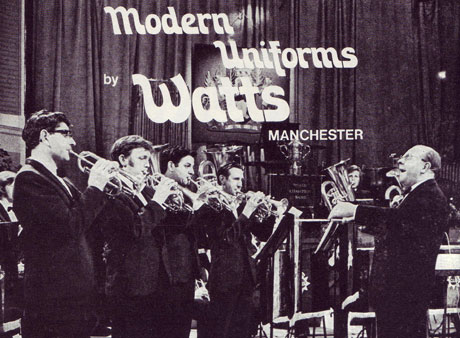
GUS in their new Watts uniforms and Stanley Boddington in his dress suit...
Over reaching
Wills then started to over reach itself and ambitious advertising plans such as ‘Wills Sports World’, saw them sponsor the London Philharmonic Orchestra as well as get heavily involved in golf, tennis (The Wills Open in Bristol was promoted as the ‘Wimbledon of the West’), putting over £50,000 into 29 horse races in the 1971 season and pumping money into horse jumping at Hickstead and car racing.
Brass band contesting with its limited appeal seemed small fry in comparison to 5 hours of television coverage on ‘Grandstand’ or ‘World of Sport’ on a Saturday afternoon.
For the time being however the 1972 contests were oblivious to the fate that was to befall them.
New regional events took place in the North of England and London whilst the profit share out was a welcome £1,500. A further three new works were commissioned for the Grand Finals in London – by Allan Street, Ronald Hamner and John Carr.
A return to old favourites in the top sections saw ‘Severn Suite’ and ‘Prometheus Unbound’ exhumed for popular appeal, whilst the winning band in the ‘Champions’ contest were to be presented with a new set of bespoke uniforms, with the conductors of the winning bands in each section getting their own dress suits – ‘…a gesture to be universally acclaimed’, proclaimed Ted Buttress.
Exhausted
Although keen to keep the contest going, Wills knew that they had perhaps exhausted their potential home market, and with little or no understanding of the banding movement, set out on the same disastrous route of the Nationals by believing that the time was right to expand the contest into Europe.
All this at a time when Britain itself hadn’t even joined the Common Market, and the country had just endured the first crippling Miners Strike (with power cuts and a State of Emergency declared by Ted Heath, unemployment passing 1 million and the IRA just having blown up the Post Office Tower in London).
It seemed to be a rather desperate and fanciful idea, brought into stark focus when both Grimethorpe and Hammonds withdrew from the ‘Champions’ event and Utrecht Gevu-Electra conducted by B. Zaal played off the number 1 draw with a performance of such awfulness that it was greeted by embarrassed silence before sympathetic applause broke out.
GUS Footwear retained its title and the Gold Clef Challenge Trophy, whilst the other sections away from the Albert Hall were still well supported with over 60 bands competing.
Trouble
Wills were in trouble and the dreadful economic climate in the UK at the end of 1972 and the early part of 1973, killed off the contest, although there is some credence to the opinion of Dr Roy Newsome in his book, ‘The Modern Brass Band’, that ‘…the band world had concluded that a further round of national championships was unnecessary.’
Audiences were down at the 1973 regional events (although the Bandsman did say that a ‘cluster’ of contests may have been to blame) and in London just three bands competed in the Third Section.
Profits were not exactly growing either – just £1,600 was handed out to the competing bands. The writing was on the wall.
The Wills tobacco empire was struggling: despite the entry to the Common Market, March 1973 saw more IRA bombings in London and around the UK, further damaging strikes and crucially, VAT at 10% introduced.
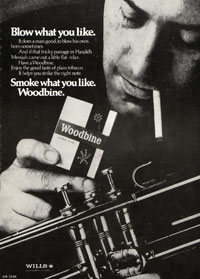 Generous investment
Generous investment
Wills was now using its hard pressed advertising budget to reach more people through television (it stated that its commitment to horse racing had risen to £55,000, and it was now sponsoring a powerboat driver called Renato Molinari at their own Embassy Grand Prix in Bristol Docks.).
It also found that despite its generous investment, the banding movement was not providing anything like the return in terms of increased profile, sales or television exposure that it had hoped.
As ever, it had held out its hand and welcomed the money, but was complacent that a ‘good thing’ was something that would last forever – and not just four years.
1973 events
Wills had taken out full page adverts in British Bandsman in early 1973 for the April Championship Finals (now preposterously called the British and European Grand Finals – although the only ‘European’ band in all sections was Isle of Jersey in the Second Section).
The Gala Concert promised Harry Mortimer, massed bands and the Luton Girls Choir the main attractions, whilst it transpired that the regional events had eventually seen 24 bands make it through to the Championship Final, 25 in the Second Section, 23 in the Third and 24 in the Fourth.
The final W.D & H.O Wills British and European Grand Finals took place on 14th April 1973 – just two weeks after VAT on cigarettes was introduced.
Last champions
The last ‘Champion of Champions’ was Fairey under Kenneth Dennison, playing the test piece, ‘Triumphant Rhapsody’.
The other section winners were Stanshawe in the Championship Section held at a sparse Imperial College, Durham Constabulary, Radcliffe Borough and Market Rasen – each of whom took home a Silver Clef Trophy and £75.
Overall profits to be dispersed to competing bands remained at £1,600 – but the contest had finally run out of steam.
Unfortunately the lack of interest was confirmed by the once ebulliently supportive British Bandsman: At the Royal Albert Hall it reported, ‘there were so few listeners that the atmosphere lacked the tense excitement one expects to experience at events of this kind.’
Although the Gala Concert attracted a better crowd (including guest of honour Sir Arthur Bliss) it was appropriate that the whole event closed with a rather sombre hymn ‘Now Thank We All Our God’.
Death knell
Although the official death knell wasn’t announced until after the 1973 Finals, Wills’ Special Events Organiser AV Ferrand, rather confirmed its demise in his programme notes to the Finals, written in the past tense: “We hope that we have contributed something substantial to the history of the brass band movement.”
The great W.D & H.O Wills Brass Band Contest experiment had finally run its course and the announcement was made in the banding press on the 10th November.
’A change of management policy’ was quoted by Ted Buttress as the reason for the company withdrawing their support, but it was obvious they saw no profitable future in spending their money on brass bands.
1974
Despite the sole rights to the contest being handed over to Ted Buttress to hold in April 1974 (which included a proposed Youth Championship) and a brave announcement of test pieces at the end of December, the rather bleak obituary appeared on the 9th February 1974 under the headline, ‘Crisis Halts Contest’ in British Bandsman.
Here it was explained that it had become, ‘…increasingly obvious…. that the economic effects of the national crisis must eventually create problems for bands particularly where high costs of travelling an accommodation are concerned.’
20 bands (from the 100 who had accepted invitations to compete) had already withdrawn from the regional events and another 11 had stated that they might take similar action.
The second Miners Strike began on the 10th March, the UK began a 5 day working week a month later and the General Election produced a hung parliament.
In these circumstances it was no wonder the contest died the death it did. We may never see its like again.
Iwan Fox















